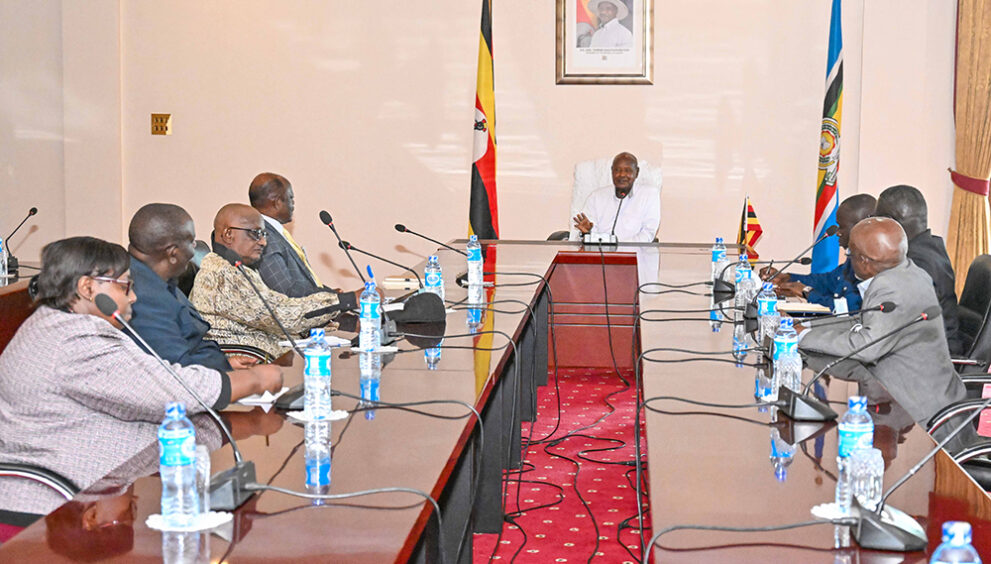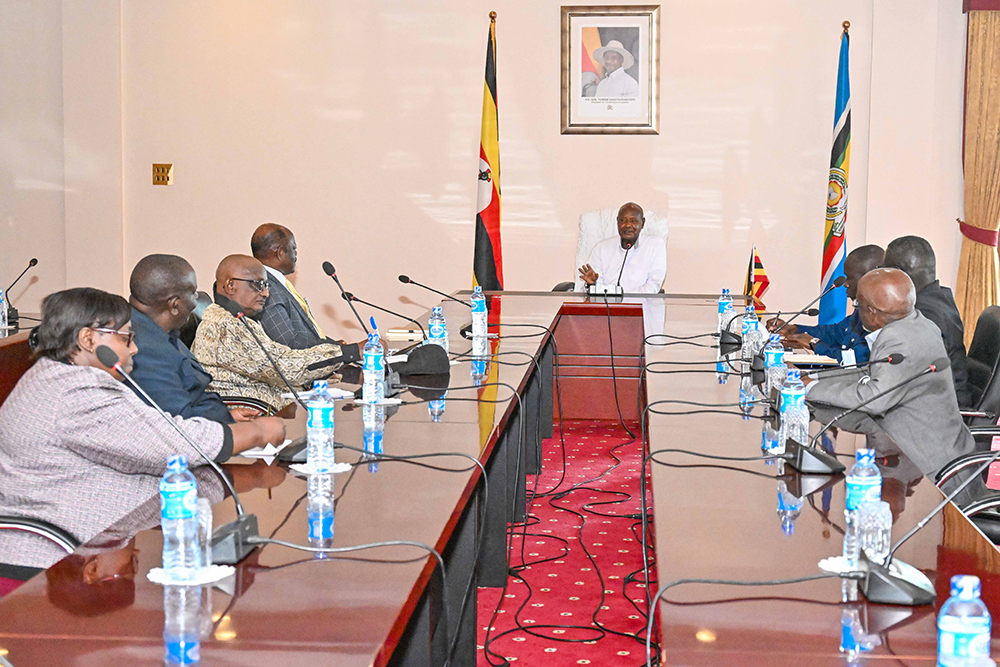President Museveni Challenges Colonial Narratives in Discussion with Makerere Scholars

President Yoweri Museveni met with Makerere University history professors to discuss African history, focusing on Uganda’s pre-colonial political structures. The meeting explored Uganda’s broader historical narrative and the need for a new educational approach to African history.

President Yoweri Museveni meets Makerere University Kampala (MUK) Vice Chancellor Prof. Barnabas Nawangwe, Makerere History Department. Present were the Ministry of Education and Sports officials at the State House Entebbe. (Photo by PPU/Tony Rujuta)
On October 16, 2024, His Excellency President Yoweri Museveni met with professors from the Department of History at Makerere University at State House, Entebbe. The discussions focused on African history and heritage.
“I was watching some commentaries on the recently concluded 62nd Independence Day Anniversary, and a remark by Professor Ndebesa Mwambutsya caught my attention. He noted that there was no Uganda until the British created it,” President Museveni observed.
“This prompted me to invite the professor and a few other colleagues from Makerere’s Department of History to engage in a discussion on African history and heritage. Fortunately, I have had the privilege of being actively involved in some of these matters for a considerable period,” he added.
The President highlighted the ethnic composition of Uganda, mentioning the Bantu, Nilotics, and Nilo-Hamites, among others, as significant groups contributing to Uganda’s identity.
He posed the question: “Has Uganda been politically united prior to British rule?” He suggested that answers could be found in oral history, archaeology, and mythology.
President Museveni pointed to the achievements of the Abatembuuzi and Bachwezi as notable political formations of their time, governing territories such as Ankole, Bunyoro, Tooro, Buganda, and parts of northern Uganda. He explained that the Luo also played a significant role in political governance following the Bachwezi era.

Makerere University Kampala (MAK) Don at the College of Humanities and Social Sciences Prof. Mwambutsya Ndebesa making his remarks. (Photo by PPU/Tony Rujuta)
He further noted that linguistic, cultural, and, in some cases, genealogical similarities serve as evidence of these historical political efforts. He emphasized the Luo influence on regions such as Toro, Bunyoro, Ankole, and Buganda, visible through their names and physical traits.
“There may have been a spiritual dimension to these political structures, but it was intertwined with the political influence of the time,” he elaborated.
The President called on Professor Ndebesa and the entire Department of History at Makerere, along with other academic institutions, to explore Uganda’s broader political governance framework, asserting that Uganda’s political history did not begin with the British. He expressed concern that it would be a historical distortion to suggest otherwise.
He remarked, “While none of these entities may have named the territory as Uganda, history shows that significant efforts were made, beyond clans and tribes, to achieve political organization, regardless of their underlying motivations.”
He also highlighted the importance of this discussion for post-colonial education, urging for a renewed approach to teaching and researching Uganda’s history and heritage.
In conclusion, President Museveni expressed his gratitude to the professors for their service to the nation.
In response, Professor Ndebesa acknowledged that pre-colonial efforts to unite Africans did exist, adding that state formation evolved through a combination of political and religious leadership.
“There were indeed efforts to unite Africans before the British, and I concede that point,” he stated.

President Yoweri Museveni meets Makerere University Kampala (MUK) Vice Chancellor Prof. Barnabas Nawangwe, Makerere History Department. Present were the Ministry of Education and Sports officials at the State House Entebbe.
Professor Samwiri Lwanga Lunyiigo requested that the President consider writing a book on the history of Uganda and Africa, emphasizing the need for Africans to document their own history. He highlighted the significance of clans and other aspects of life in providing a clearer understanding of African identity.
Professor Lunyiigo also commended the President for his extensive knowledge of African history.
The meeting was attended by the Minister of State for Sports, Hon. Peter Ogwang, Makerere University Vice-Chancellor Prof. Barnabas Nawangwe, and other notable figures.







